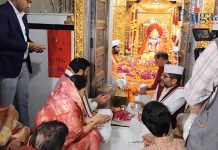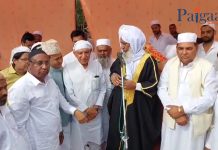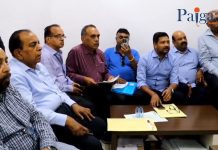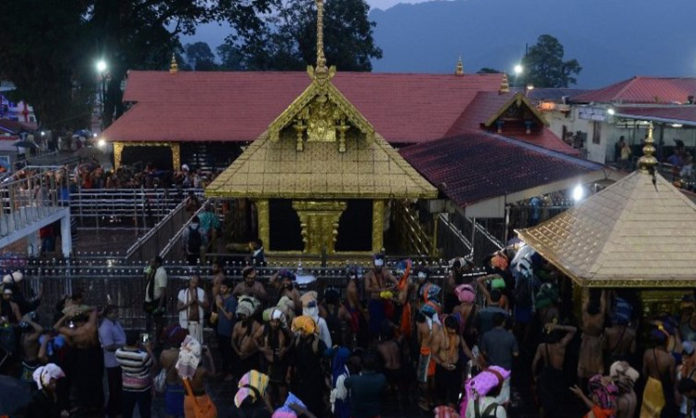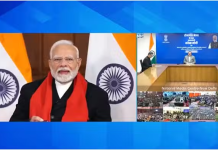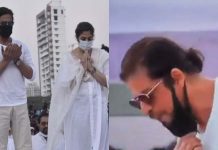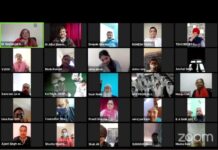New Delhi, January 15: The Supreme Court is unlikely to take up on January 22 close to 50 petitions seeking review of its Sabarimala verdict allowing women of all age groups into the famous hill-top shrine in Kerala.
Chief Justice of India Ranjan Gogoi on Tuesday said it may not be possible to hear the review petitions as Justice Indu Malhotra is on medical leave.
The CJI was responding to advocate Mathew J Nedumpara’s plea for live streaming of the hearing of the hearing of Sabarimala review petitions. The advocate mentioned the matter this morning before the CJI’s Bench.
The Supreme Court in November last said it would take up on January 22 in open court close to 50 petitions seeking review of its Sabarimala verdict allowing women of all age groups into the famous hill-top shrine in Kerala.
But a five-judge Bench headed by Chief Justice of India Ranjan Gogoi had said there will be no stay on its September 28 verdict allowing entry of women of all age groups to the temple.
“Applications for hearing of review petitions in Open Court are allowed,” the Bench had said posting all the review petitions along with all pending applications for hearing on 22nd January, 2019 before “the appropriate Bench”.
“We make it clear that there is no stay of judgment dated September 28…,” said the Bench, which also included Justice Rohinton Nariman, Justice AM Khanwilkar, Justice DY Chandrachud and Justice Indu Malhotra.
The court had already made it clear that fresh writ petitions would be taken up after review petitions were decided.
As per general norms, hearing on review petitions are done through a procedure called “hearing by circulation” in chamber of the CJI where parties were not represented by their advocates.
But in exceptional cases, review petitions are heard in open court and parties can be represented by their advocates.
Earlier, the Supreme Court had several times refused to give urgent hearing to petitions seeking review of its ruling lifting age-old restrictions on procreating women from entering famous Lord Ayyappa Temple at Sabarimala.
A Constitution Bench headed by the then CJI Dipak Misra had on September 28 lifted the restriction on the entry of women into the temple, evoking a series of protests by women devotees of Lord Ayyappa.
The review petitioners contended that “sheer uniqueness” of Sabarimala Temple made it a fit case for grant of religious denomination status.
By 4:1, a five-judge Constitution Bench headed by then Chief Justice Dipak Misra had declared the practice unconstitutional. Justice Indu Malhotra, the lone woman on the Bench, had dissented. The majority declared unconstitutional Rule 3(b) of the Kerala Hindu Places of Public Worship (Authorisation of Entry) Rules, 1965 which barred entry of women between 10 and 50 years of age into the temple.
The review petitioners, including Nair Service Society and People for Dharma, said the top court wrongly concluded that exclusion of women between the age of 10 and 50 was discriminatory and erred in allowing women of all age groups into the temple.
“A clear perusal of the opinions rendered as part of the majority view shows that apart from patent legal errors, the factually erroneous assumption that the practice of the temple is based on notions of menstrual impurity has materially contributed to the majority view. This necessitates a review of the judgment,” read one of the petitions.
The petitioners submitted that to deny a religious denomination status to Sabarimala Temple and Lord Ayyappa’s devotees merely because they did not conform to Abrahamic notions of religious denominations, “is to defeat the very object of the absence of a definition and to abrahamise the core of the Hindu faith, which is unconstitutional”.
“In the present case, the subsequent events that transpired after the judgment of which judicial notice may be taken, clearly demonstrate that overwhelmingly large section of women worshippers are supporting the custom of prohibiting entry of females between the age of 10 and 50 atSabarimala temple,” Nair Service Society said, adding its submissions had not been set out in the judgment.
The review petitioners pointed out that the petitioners in the original PIL were not devotees of Lord Ayyappa and hence had no cause of action to approach the court.
Millions of devotees whose fundamental right to religion was infringed did not get an opportunity to be heard and the review petition was the first opportunity for them to “to assert their rights and seek enforcement thereof”.
The petitioners contended that the majority opinion erred in not considering the evidence placed on record which demonstrated that the practice was a direct consequence of the celibate form of Lord Ayyappa and the rules of Naishthika Brahmacharya which applied to the deity.


